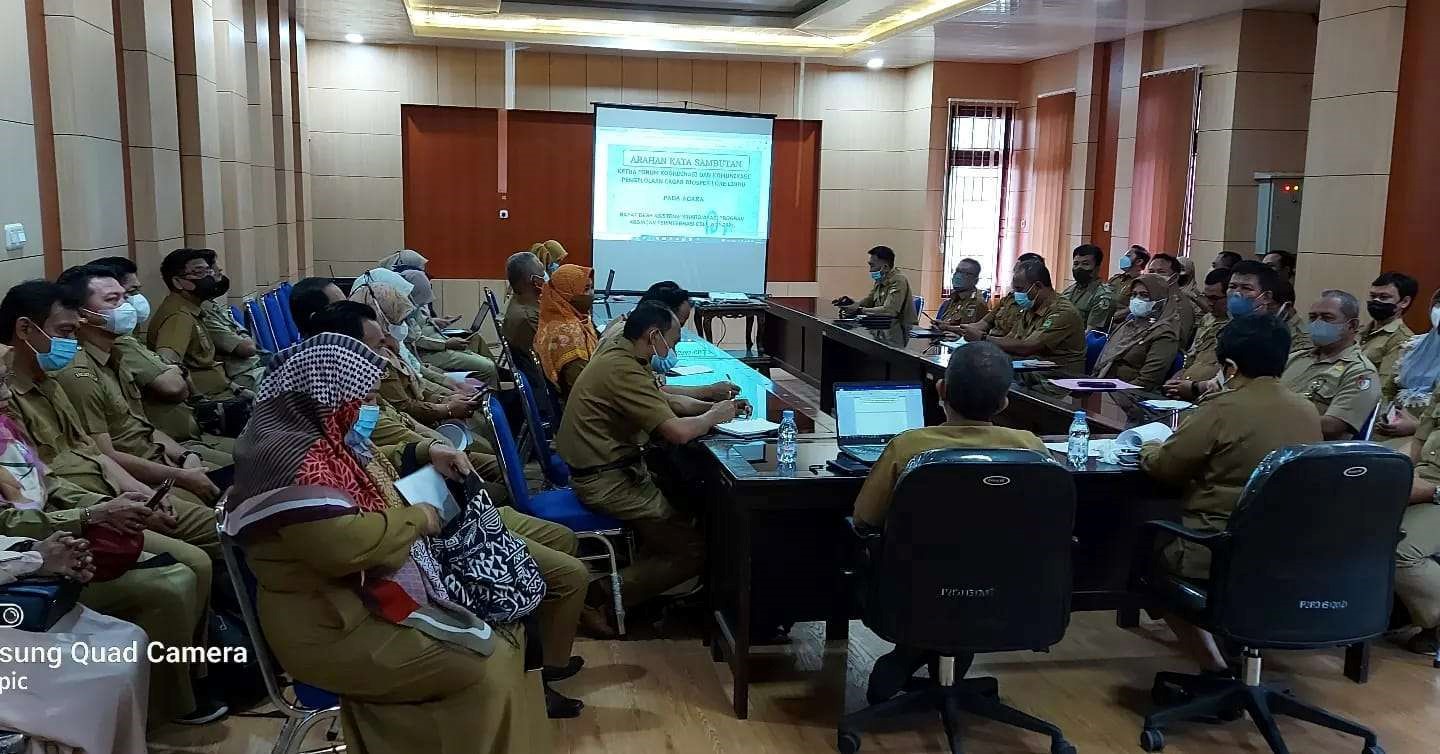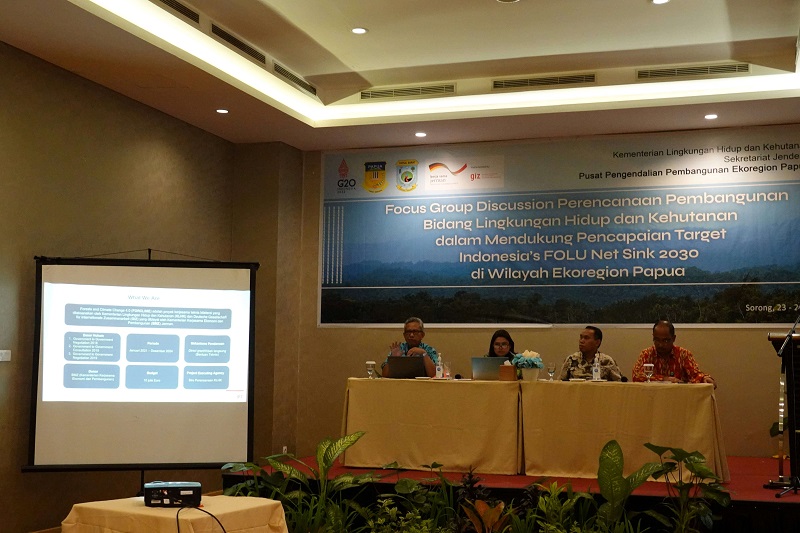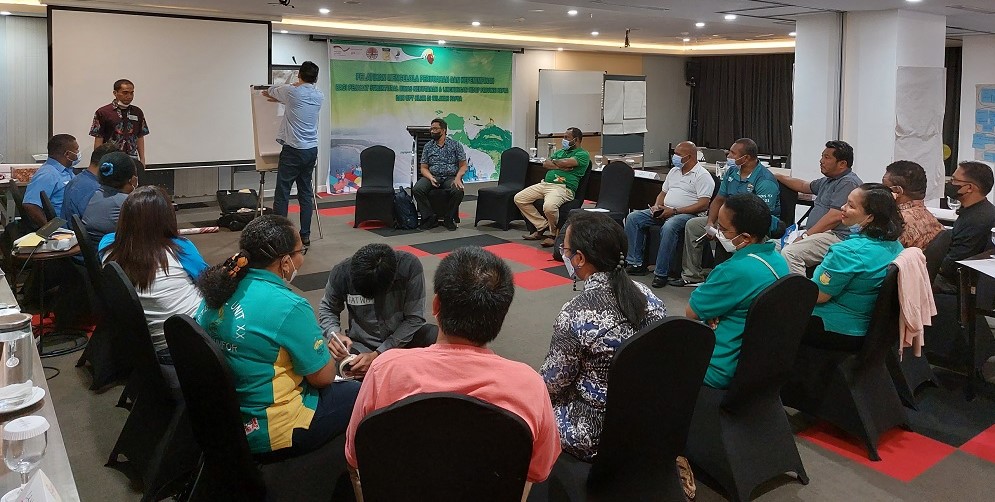FORCLIME
Forests and Climate Change ProgrammeTechnical Cooperation (TC Module)

Select your language

In order to ensure that the biosphere reserve can function in line with its designated purposes, Man and the Biosphere United Nations Educational, Scientific and Cultural Organization (MAB-UNESCO) conducts periodic reviews of biosphere reserves every 10 years. This periodic review process is set to be implemented within the Lore Lindu Biosphere Reserve (LLBR) in 2023 or 2024.
With the purpose of preparation for the periodic review of the LLBR, comprehensive data and information on the activities being undertaken in each zone (core, buffer and transition) are required. FORCLIME is supporting the Coordination and Communication Forum for LLBR Management in relation to the collection of data and the synchronization of integrated programmes in the LLBR during the 2021 - 2024 period. Against this background, an activity was held on Monday, 26 September 2022 at the Office of the Regional Development Planning Agency (Bappeda) for Central Sulawesi Province and was opened by Dr. Ir. Christina Shandra Tobondo, MT., the Head of Bappeda of Central Sulawesi Province, who also serves as Chair of the Coordination and Communication Forum for LLBR Management.
During the event, Regional Apparatus Organizations operating within the LLBR were invited to exchange data and information relating to the programs that are being implemented in each zone. In addition, discussions were also held to assess any obstacles that are being faced during the implementation of activities within the LLBR area. Through this activity, sustainable development activity data will be collected from various parties and is expected to provide an overview of the current state of the biosphere reserve, as well as inputs for the preparation of Lore Lindu Biosphere Reserve action plans in the future.
For more information, please contact:
Fikty Aprilinayati, Advisor for Sustainable Forest Management and Biosphere Reserve Management
Ismet Khaeruddin, Senior Adviser for Biodiversity Focal Point for the KFW Forest Program 3 and Provincial Coordinator for Central Sulawesi

With the goal of coordinating planning and controlling environmental and forestry development within the Papua Ecoregion, the Papua Ecoregion Development Control Center (P3E Papua), supported by FORCLIME, conducted an FGD on Environmental and Forestry Development Planning in Sorong City, West Papua from 23 - 24 September 2022. The purpose of this meeting was to synergize the national environmental and forestry development planning agenda with regional apparatus organizations that relate to the Strategic Agenda of the Ministry of Environment and Forestry (KLHK), specifically the implementation of FOLU Net Sink 2030, as stipulated under Minister of Environment and Forestry Decree No. 168/MENLHK/PKTL/PLA.1/2/2022.
The FGD was opened by the Secretary General of the Ministry of Environment and Forestry, Dr. Ir. Bambang Hendroyono, M.M., who is also acting as the Director General for the Conservation of Natural Resources and Ecosystems at the Ministry of Environment and Forestry, and was attended by relevant regional apparatus organizations from the Provincial Governments of Papua and West Papua. Moreover, all KLHK technical implementing units in Papua and West Papua were also present.
Through this activity, it is hoped that synergy can be created between the technical implementing units of the Ministry of Environment and Forestry and regional apparatus organizations in order to optimize the achievements of the FOLU Net Sink Indonesia 2030 target, particularly within the Papua Ecoregion.
For more information, please contact:
R. Rizka Dewi Zuleika, Junior Adviser for Sustainable Forest Management
Wandojo Siswanto, Strategic Area Manager for Forest Policy and Climate Change

Since the implementation of the Omnibus Law or UUCK Cipta Kerja, the role of Forest Management Units (KPH) has shifted from being more business-oriented in nature towards becoming more involved in the monitoring of forest operations and facilitating forestry investments, including as a provider of public services to local communities. As a result, KPH must ensure that they are managed by adequate human resources, both in terms of quantity and quality. Adequate in quantity means that the number of human resources in a given KPH is proportional to its workload in accordance with its main duties and functions. While adequate in quality means that the human resources of a given KPH manager have competencies that are in accordance with the standards and objectives of the KPH management.
With the intention of supporting capacity building among the KPH personnel working in Papua and West Papua Provinces, the Human Resources Extension and Development Agency (BP2SDM) of the Ministry of Environment and Forestry (KLHK), working in conjunction with FORCLIME, held a recent Training Needs Assessment (TNA) that involved a focus group discussion (FGD). The objectives of this FGD were firstly to disseminate various activities in order to assess the training requirements for KPH institutions working in Papua and West Papua Provinces. Secondly, the FGD was aimed at identifying requirements in relation to capacity building at the individual and organizational levels for KPHs and CDKs in Tanah Papua. During the FGD, the participants also filled out special online TNA questionnaire forms.
The FGD on training needs assessment within Papua Province was held on 3 September 2022 in Jayapura and was attended by 20 participants representing KPH and CDK in Papua Province. Meanwhile, in West Papua Province, an FGD was held on 17 September 2022 in Sorong, West Papua and was opened by the Secretary of the Forestry Service of West Papua Province. This particular FGD was attended by 18 participants representing KPH and CDK in West Papua Province.
The workshop was facilitated by the Community Forestry Communication Forum (FKKM), a consulting agency with experience in developing human resources aimed at supporting forestry development, particularly the Social Forestry Programme including the development of its human resources. The workshop resulted in a list of competency development needs that can now be used as a reference during education and training planning processes for relevant parties, in particular, the Environment and Forestry HR Training Center, the Environment and Forestry Training Center, Forestry Service/KPH, donor agencies and others.
As a follow-up to this workshop, the consultant will visit several KPHs to conduct in-depth interviews with KPH officials and staff at said selected KPHs, collect online data for KPH officials and staff in KPHs in Tanah Papua who cannot be visited, and prepare reports. Furthermore, a workshop will be held to encourage inputs aimed at the improvement of the prepared draft report.
“We hope that the results of the training needs assessment will be communicated to the Ministry of Environment and Forestry and the West Papua Provincial Forestry Service so that greater clarity will emerge regarding the main tasks and roles of KPH regarding forestry development within West Papua. We also hope that human resources can be developed in accordance with requirements in the field,” explained Donny N. Bosawer, S.Hut., M.Sc. from CDK Sorong Selatan.
For more information, please contact:
Edy Marbyanto, Strategic Area Manager for Human Capacity Development
 |
Supported By: |
  |